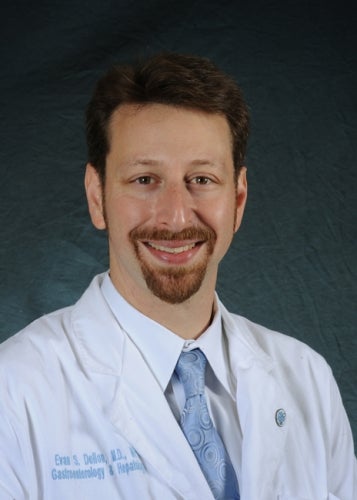Evan S. Dellon, MD, MPH, will lead UNC’s role in the new consortium.

Wednesday, October 8, 2014
The University of North Carolina School of Medicine is one of several organizations nationwide partnering in a new consortium that will conduct clinical research into eosinophilic gastrointestinal disorders and train investigators how to conduct clinical research in this area. This network has been termed CEGIR, for Consortium of Eosinophilic Gastrointestinal Researchers.
Evan S. Dellon, MD, MPH, associate professor of medicine and epidemiology in the UNC School of Medicine and the UNC Gillings School of Global Public Health, will lead UNC’s role in the consortium.
“I am excited that UNC will be able to participate in this important collaborative project,” Dellon said. “CEGIR is a unique opportunity for experts from across the world to not only perform clinical and translational research, but to train a new generation of investigators. Importantly, patient advocacy groups will help guide the research focus so that results are applicable to issues patients care the most about. I would expect that these studies will bring transformative changes to the care of patients with EGIDs.”
Eosinophilic gastrointestinal disorders are chronic inflammatory disorders. These conditions are thought to be triggered by allergic hypersensitivity to certain foods and an over-accumulation in the gastrointestinal tract of white blood cells called eosinophils, which are part of the body’s immune system. Patients with these disorders can experience a variety of gastrointestinal complaints including reflux-like symptoms, vomiting, difficulty swallowing, tissue scarring, fibrosis, the formation of esophageal strictures, diarrhea, abdominal pain, failure to grow in childhood, and other medical complications.
When inflammation is in the esophagus, the condition is known as eosinophilic esophagitis. When it is in the stomach, the condition is called eosinophilic gastritis. When it is in the colon, it is known as eosinophilic colitis. While most prior work on these conditions has concentrated on eosinophilic esophagitis, the new grant will also focus on eosinophilic gastritis and colitis.
Marc Rothenberg, MD, PhD, director of the Cincinnati Center for Eosinophilic Disorders at Cincinnati Children’s Hospital Medical Center, is the principal investigator on the grant. Glenn T. Furuta, MD, professor of pediatrics and director of the Gastrointestinal Eosinophilic Diseases Program at Children’s Hospital Colorado, will serve as the administrative director. In addition to Cincinnati, Colorado, and UNC, CEGIR includes clinical, basic, and translational researchers from Rady Children’s Hospital (San Diego), Lurie Children’s Hospital (Chicago), Northwestern University (Chicago), Riley Children’s Hospital (Indiana), the National Institutes of Health (Washington, DC), Tufts University (Boston), Children’s Hospital of Philadelphia and Bern University (Switzerland).
These sites were chosen based on their previous record of collaboration; expertise in relevant clinical specialties, including gastroenterology, allergy, immunology and pathology; the ability to integrate children and adult patients into the consortium; and their well-established record of excellence in clinical research. These sites are considered the major centers working on these diseases, and these sites have access to a comprehensive database of more than 8,000 patients.
CEGIR will also work with patient advocacy groups, including the American Partnership for Eosinophilic Disorders, the Campaign Urging Research for Eosinophilic Disease, and the Eosinophilic Family Coalition, to address the clinical problems of most importance to patients and their families.